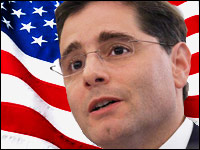
For so-called Net neutrality advocates, FCC Chairman Julius Genachowski’s Monday morning speech at the Brookings Institution must have reached their ears like sweet music — legally downloaded music, that is, delivered on a very fast wireless connection.
Genachowski told the Brookings audience that he will begin the process of transforming the agency’s current guidelines for managing Internet policy into official FCC rules. Those guidelines include the current principles known as the “four freedoms,” as first proposed in 2004 by then-chairman Michael Powell.
“These principles can be summarized as: Network operators cannot prevent users from accessing the lawful Internet content, applications, and services of their choice, nor can they prohibit users from attaching non-harmful devices to the network,” Genachowski said.
Case for Transparency
However, Genachowski is adding two more principles that promise lively debates between neutrality advocates and telecommunications companies when the public comment process begins: non-discrimination and transparency.
“[Service providers] cannot block or degrade lawful traffic over their networks or pick winners by favoring some content or applications over others in the connection to subscribers’ homes,” Genachowski said. “Nor can they disfavor an Internet service just because it competes with a similar service offered by that broadband provider. The Internet must continue to allow users to decide what content and applications succeed.”
As for the issue of transparency, as the chairman sees it: “We cannot afford to rely on happenstance for consumers, businesses and policymakers to learn about changes to the basic functioning of the Internet. Greater transparency will give consumers the confidence of knowing that they’re getting the service they’ve paid for, enable innovators to make their offerings work effectively over the Internet, and allow policymakers to ensure that broadband providers are preserving the Internet as a level playing field.”
Adding Wireless to the Net Neutrality Mix
The non-discrimination aspect of the issue relates to the FCC’s actions in summer 2008 against Comcast. The cable service provider slowed down some file-sharing traffic on its networks as a way to manage heavy user volume, only to face sanctions from the FCC. Comcast has sued the agency in a federal appeals court, claiming it had no right to punish the company for how it runs its networks.Although individual agency commissioners like Michael Copps have previously said they believe wireless companies are also subject to Net neutrality principles, consumer advocates say Monday’s speech was the first time that a sitting commissioner has tied the rapidly-growing wireless space to the open Web issue.
“In considering the openness of the Internet, it is also important to recognize that our choice of technologies and devices for accessing the Internet continues to expand at a dizzying pace,” Genachowski said. “New mobile and satellite broadband networks are getting faster every day, and extraordinary devices like smartphones and wireless data cards are making it easier to stay connected while on the go,” he added.
“It’s one thing to have Copps and other commissioners say the same principles that apply to wireline access also apply to wireless,” Free Press Policy Counsel Chris Riley told the E-Commerce Times. “It’s another thing, and a really positive step, for the chairman to say we’re developing rules and wireless will be a part of those rules. We think that is a real hallmark for progress.”
Widespread Reaction
Free Press is one of several consumer advocacy groups hailing Genachowski’s speech and plans for codifying Net neutrality. “The debate over Net neutrality at times has felt like a marathon, but today the finish line is in sight,” said Free Press Executive Director Josh Silver. “Chairman Genachowski’s speech today shows the FCC intends to follow through on President Obama’s pledge to protect the free and open Internet.”
Other media statements were also flying to reporters’ email in-boxes and trade group Web sites. T-Mobile referred a request for comment from the E-Commece Times to the Cellular and Telecommunications Industry of America (CTIA). A statement on the CTIA Web site from its Vice President for Regulatory Affairs Chris Guttman-McCabe raised concerns about “unintended consequences” of additional Web regulation and the potential for stifling the growth of unique wireless devices and applications.
“Unlike the other platforms that would be subject to the rules, the wireless industry is extremely competitive, extremely innovative, and extremely personal,” Guttman-McCabe said. “How do the rules apply to the single-purpose Amazon Kindle? How does it apply to Google’s efforts to cache content to provide a better consumer experience? How about the efforts from Apple and Android, BlackBerry and Nokia, Firefly and others to differentiate the products and services they develop for consumers? Should all product and service offerings be the same?”
“Consumers face incredible barriers switching from one wireless provider to another,” answered Riley, bringing up the issues of termination fees and the inability to take phones with them from one carrier to another. “No matter how you look at it, the wireless market is not effectively competitive. CTIA is right that we do not want a complete system that makes all service offerings the same. We want to allow for differentiation, and properly designed Net neutrality rules will do just that.”
Pro-Consumer or Anti-Competitive?
The Competitive Enterprise Institute was not impressed with Genachowski’s plans, to say the least. Calling Net neutrality “anti-competitive, pro-bureacratic,” CEI Vice President for Policy Wayne Crews said that “the so-called ‘principle’ of regulated non-discrimination is an incoherent abhorrence. It advances the aims of regulators and transitory special interests, not consumers — sparring behemoths like Google, Apple and AT&T can take care of themselves,” he added.
“Wireless industry players are disciplined by intense competition,” information policy analyst Ryan Radia told the E-Commerce Times. Radia follows the wireless industry for CEI. “Virtually all U.S. consumers can select from four competing national carriers and dozens of regional carriers. Carriers are investing tens of billions of dollars annually to upgrade their networks to offer faster speeds and better coverage. In the next few years, several carriers are set to launch Long-Term Evolution (LTE) networks, also known as ‘4G,’ which promise vastly increased speeds and capacities. Price competition among wireless carriers is also cutthroat, as evidenced most recently by Sprint’s Any Mobile announcement.”























































Seems like the ISP’s are telling the FCC, give us what we want or we will be cry babies and sit in the corner pouting instead of implementing newer technologies that increase broadband access and speeds for everyone in the nation.
Boo hoo. The internet needs to be redesigned from the ground up because everyone is too cheap to pull fibre to the house.